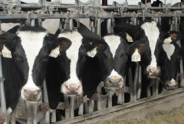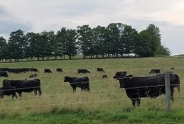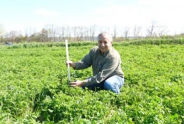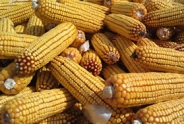First Cutting Monitoring-April 28, 2020
Kevin Ganoe, Area Field Crop Specialist
Central New York Dairy and Field Crops
Our team began with what we have called a dry run for our first cutting monitoring. It's hard to settle on a date as we can either be too early or at times find the first check of fields leaves us using that week's data because of how far along the crop is. Yesterday was definitely in the category of too early so we have no summary for you but will share what we learned.
A comparison with last year where we began on April 30, 2019, is a good place to start:
The average alfalfa height for April 30, 2019 was 7.2 inches
The average alfalfa height for April 28, 2020 was 5.0 inches
On April 30, 2019 we had 28 percent of the fields at least 10 inches tall which is minimum height for our equations to work.
There were predictions for nearby all grass fields to be ready for harvest by May 2-4.
On April 28 2020 we have no fields over 8 inches tall and only 16 percent of the fields (5) are 8 inches. Most of the fields were 6 inches (9 fields).
Many fields have had snow on them in the past week and or frost. One field had 5 inches of snow on it yesterday.
Alfalfa growing degree days are Base 41 or you need 41°F for growth to occur. Last year by April 30, 2019 we had accumulated 213 GDDs on average in our 8 counties since March 1. The 15 year average is 184 GDDs. This year using forecasted temps for April 30 we will only have 103 GDDs on average since March 1. The short GDDs this year explains why we started last year on April 30 and this year May 5 might be a week we have some predictions for harvest before May 12.
We will continue Tuesdays from now until the end of May. A reminder, given the COVID-19 outbreak, to keep our risk of exposure down we have reduced the number of fields we are measuring from 65 to 32. Apologies to those whose fields we have measured in the past.
Hopefully things warm up by next week.
Upcoming Events
Pesticide Applicator Exam Prep Course
February 2, 2026 : Pesticide Applicator Exam Prep Course - Ballston Spa
Ballston Spa, NY
February 5, 2026 : Pesticide Applicator Exam Prep Course - Cobleskill
Cobleskill, NY
CANCELLED
February 6, 2026 : Pesticide Applicator Exam Prep Course - Herkimer
Herkimer, NY
February 9, 2026 : Pesticide Applicator Exam Prep Course - Morrisville
Morrisville, NY
February 13, 2026 : Pesticide Applicator Exam Prep Course - Norwich
Norwich , NY
I Thought I Was Covered for That! - Farm Insurance Webinar Series
January 13, 2026
January 20, 2026
January 27, 2026
February 3, 2026
February 10, 2026
Free Webinar Series
Swine Production Zoom Series
February 5, 2026
February 19, 2026
March 5, 2026
March 19, 2026
April 2, 2026
Register for the whole series or for one or several sessions.
Announcements
Statewide Field Crop Pathology Needs Assessment Survey
Your input is wanted for identifying priorities!Sign Up for Our Weekly E-Newsletter
We send out a bi-weekly e-newsletter that has announcements, upcoming programs, and opportunities for you! Registration is quick, easy, and free. Click here to sign up today!Farmers Can Join MeatSuite For Free!
MeatSuite.com is a free resource provided by Cornell University where NY meat farmers can create a farm profile and list their bulk (wholes, halves, quarters) and bundled (i.e. Grilling Bundle) meat products.Why should farmers join?
1. It's free and easy!
2. Connect with more local customers. In the past year the MeatSuite.com farm directory had 8,300 visits from New York consumers. Farm profiles get as many as 25 views per month from potential local customers. We also spotlight MeatSuite farms on social media and bring attention and purchases to farms through highlights and giveaways.
How do I join?
Farmers can visit https://www.meatsuite.com/farmers/ to create a free farm profile. You must list at least one product for your farm's profile to go live. You'll also have access to Cornell's free Meat Price Calculator, a helpful tool for pricing your meat to make a profit.
While you're on MeatSuite, check out the "Creating Consumer-Friendly Bulk Meats" publication on the log-in page. It has tips on how to create bulk meat products that are easier for first-time buyers to say "yes" to.
If you have any questions as you create your farm profile or products, we're here to help! Please email Matt LeRoux at mnl28@cornell.edu.




